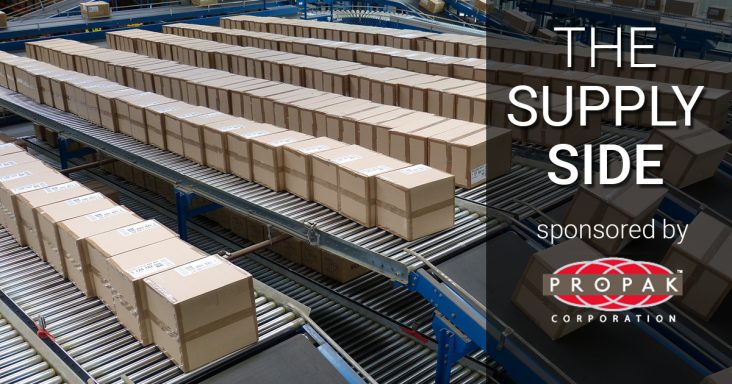The Supply Side: Former Walmart, Sam’s Club exec talks Michaels turnaround
by October 31, 2021 9:57 am 3,737 views

Arts and crafts specialty retailer Michaels Stores Inc. had lost its way by the time Ashley Buchanan took the reins as CEO in January 2020. His job to turn around the Texas-based retailer became more complicated thanks to COVID-19.
Buchanan, a former Walmart and Sam’s Club executive in Bentonville, spoke recently at the Texas A&M Center for Retailing Studies Summit in Dallas. He said he was happy at Walmart and Sam’s Club and raising his family in Northwest Arkansas when Michaels came calling. But the idea of moving back to his home state had some appeal, as did managing a turnaround at the smaller specialty retailer.
Two weeks into his job as CEO, Buchanan said he called his first COVID meeting as he watched it spread across Asia and into Europe. In the fall of 2019, Buchanan said he read a novel on the Spanish flu pandemic from 1918, so he felt the need to act early. He said he knew omnichannel would become more important even in the hands-on crafting space, but he had no idea how fast arts and crafts would take off once consumers stayed at home.
In the early pandemic days of April 2020, NPD Group reported a 70% increase in arts and crafts sales, particularly in craft kits and reusable compounds. The increased consumer interest continued throughout 2020, with indexed Google search volumes for terms like “knitting,” “embroidery,” and “crocheting,” outpacing the year prior 6%, 12%, and 18% respectively, according to Google Trends.
In 2021, the more prominent players began focusing on social media strategies and building out their ad targeting strategies to appeal to the casual crafter.
“I think the crafting sector will remain larger than it was pre-pandemic,” said Neil Saunders, managing director of retail search agency GlobalData Retail. “However, I think it will be difficult to replicate the kind of sales growth that was seen in 2020.” He added that to further aid growth, “crafting retailers need to keep customers engaged, maybe by creating online communities with videos and tutorials and a social aspect.”
Buchanan said that before Michaels could benefit from the crafting craze, there was plenty of work to do. He said e-commerce was a paltry 4% of total sales and the user experience was terrible as there was no mobile app and conversions were less than 1% of visits. He said the backroom was overrun with inventory and the high/low pricing strategy was exhausting.

The first order of business was to check-in with customers. Buchanan said he spoke to thousands of customers, and the consensus answer he got was that loyal customers loved Michaels, but the company was making it complicated. He said the retailer had also somewhat lost its identity as an arts and crafts retailer for makers and crafters.
“We were carrying way too much home decor and not enough crafting materials,” he said. “I knew we would need to streamline our supply chain and back rooms to be effective once the pandemic hit the U.S. At the time, our inventory averaged seven touches, which is unacceptable in retail. We got that down to two. We also added two new distribution centers and equipped our 1,200 stores to do curbside pickup for online orders by the time the pandemic hit the U.S.”
Buchanan said he also insisted on a new home office location that allowed for open and collaborative spaces. And because there was so much office space on the market, the costs were lower, and the new space was 40% smaller than the segmented home office built in the 1980s.
He said the company is just getting started on the total transformation, comparing it to being in the third inning of a nine-inning baseball game. One area he worked to improve was the social community that began to blossom amid the pandemic. He said that because Michaels had worked to revamp its website with outside developers and internal tech division, the retailer could easily host programming for making art projects. He said this part of the business has taken off, and there are free classes on the site and paid sessions. Participants can order the supplies in a bundle and pick them up at the local store or deliver them before class.
He said the inventory overruns were thinned out last year by running promotions for the curbside pickup. With leaner inventory, the company can focus more on serving the “makers,” which are the bread and butter for the business.
Michaels grew its social media followers to 3.2 million last year and recorded sales of $1.9 billion in the fourth quarter of 2020, up 12% from the prior-year period. Private equity firm Apollo Capital Management purchased the company in March 2021 for $5 billion. Buchanan said the move to private has been seamless, and it has also allowed more agility for big moves without worrying about shaking investor confidence on Wall Street.
Buchanan said Michaels’ chief competitors in the U.S. are Hobby Lobby, which focuses more on home decor items, and Joann, which has a fabric focus. Joann saw a 24.3% boost in revenue in the first quarter of 2021, compared to a year ago. Based in Oklahoma City, Hobby Lobby is also a private company with more than 930 U.S. store locations. Company revenue ahead of the pandemic was estimated at $5 billion annually, more than double that of Michaels.
Joann is based in Cleveland, Ohio, and is run by former Tyson Foods and Walgreen’s executive Wade Miquelon, who took over as CEO in February 2019. Joann, formerly owned by Leonard Green & Partners, went public in March with an initial offering price of $12 per share. The company raised $130.8 million with the initial stock offering and now has a market capitalization of $468 million, with three-quarters of results recorded as a public company. Third-quarter revenue for Joann totaled $496 million, about one-quarter the size of Michaels.
Hobby Lobby and Joann have locations in Northwest Arkansas, but Michaels does not. The closest Michaels stores are in Fort Smith and Joplin, Mo.
Buchanan said the company has not ruled out a future location in Rogers at some point, but the focus is on growing online sales and running more efficient stores. He said the company is trying to get away from high/low discounting and move to a loyalty program targeted to makers, its core customers.
Editor’s note: The Supply Side section of Talk Business & Politics focuses on the companies, organizations, issues and individuals engaged in providing products and services to retailers. The Supply Side is managed by Talk Business & Politics and sponsored by Propak Logistics.
